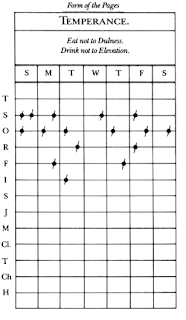I love doing projects! So, I'm working through Benjamin Franklin's list of virtues. As I mentioned, Ben Franklin had a list of 13 virtues and he made a chart whereby he observed himself in relation to these virtues each day, casting a critical eye on his daily behavior for the purpose of personal growth. Each week he worked on a specific virtue (written at the top of the list), but also paid attention to all the rest each day. The idea was to attempt to master all of them by the end of the 13 weeks. Franklin himself admitted that he thought it impossible and that he knew he did not perfect them himself, but he still maintained that it was a great and profitable project for anyone to undertake. His chart looked like this:
The little black marks are where he stumbled that day.
I decided that it sounded like a worthy project and, agreeing that his 13 virtues are all agreeable to me, qualities toward which I would like to aspire, I undertook the project of using the chart on myself. While we were in Sacramento, I made 13 charts for myself in my Tony Millionaire's Sock Monkey Journal that I take with me where ever I go.
Week One was Temperance (which I do fairly well with. It's temperance not just in drinks, but also in food. In spite of what my appearance might suggest, I've actually made great progress in moderating my diet.) It was also the week when we went to Sacramento and looking back at the end of the week I was alarmed at how poorly I'd done in the Frugality column. In retrospect I think it may have been circumstantial (we ate out for almost every meal in Sacramento out of necessity.) OR, as Franklin suggests, awareness may have curbed my behavior. The latter explanation makes this whole exercise sound more effective, so let's go with that. This week, however, back into my usual life circumstances, I find that Tranquility is my most often checked column and, undoubtedly an enviable virtue to possess, something I would do well to work on maintaining at all times.
This week is Silence which, on the surface, those who know me in person might think I am a master, but it mainly speaks to idle, trifling, or even worse, harmful conversation. This comes just after Pastor Walt preached from the Epistle of James on bridling the tongue. It may be worth noting the order. I have found that a breach in Temperance, even in drinking too much coffee, can lead to a breach in Silence, giving trifling, superfluous, and even harsh conversation. So we see a domino effect in self-control. As Socrates reportedly said,
"False words are not only evil in themselves, but they infect the soul with evil."As a side note, the final virtue in the list is Humility, and Franklin gives the exposition "Imitate Jesus and Socrates." Which I nodded over with a knowing, contented smile at first, but after about two days of the project I realized I was really hazy on what Socrates was like. I hadn't read one lick about Socrates in about a decade. Off I toddled to my beloved library and planted my nose in Plato (it's okay. Everyone knows Plato is non-toxic.) Our only records of Socrates come from the writings of his disciples (although there is also a parody of Socrates in Aristophanes' play The Clouds where he is portrayed as sort of a dirty charlatan and a thief. Soren Kierkegaard believed Aristophanes' lampooning of Socrates was probably a more accurate representation of the man than the writings of his disciples. It may be true that there is sometimes more truth is in parody than in starry eyed admiration, but that assertion takes a darker turn when one realizes that Aristophanes' play may very well have played a major role in swaying the public opinion to the point of the real Socrates' execution. It is possibly also relevant to remind readers that Kierkegaard came about two generations after Ben Franklin and that Kierkegaard's assertion was both novel and a bit shocking. So Franklin would not have given the Aristophanes representation a moment's worth of serious consideration in this matter. If pressed for my own opinion, I really would prefer to think that Socrates was as Plato and Xenophon described. Anyway, for my purposes here, it's more a helpful figure to look toward.)
I assume what Franklin meant was the Socratic ideal that virtue is its own reward, more valuable than wealth, and, in fact, possibly the meaning of life. That last sentiment I can only accept coupled with the admonition to attempt to imitate Jesus as well, whose teaching takes it to the next level of the meaning of life being glorifying God and that virtue springs from a heart inclined in that direction. As John Woolman puts it, "wisdom from above which leads to a right use of all gifts, both spiritual and temporal." In both cases, I imagine Franklin is arguing, they were willing to follow the path of virtue even unto death. While Franklin and I have very different points of view on Jesus, I appreciate his point in reference to this specific exercise.
I think at the end of this project, self-awareness and diligence will be the fruits. I should probably add that it is not my intention to pound a bass drum of how nifty I am (lest I get a cold prickly in my Humility column) in reporting on this project. Rather I think that this is something people should do. I think we ought to be self-aware and, thereby, foster self-control.
As Socrates reportedly said,
"The unexamined life is not worth living for a human being."I plan on reporting back when my experiment is complete, but I also have more to say on this topic in my upcoming post about John Woolman.


No comments:
Post a Comment